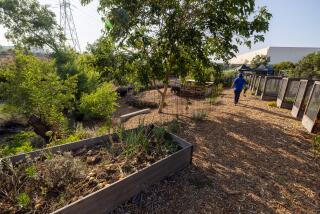Miami School Program Uses Older Volunteers as Mentors for Students
- Share via
MIAMI — They were an unlikely duo: 71-year-old Wesley Wilson, a bearded former landscaper, and his assistant, a lanky 14-year-old named Fred Barney.
They stood before a dozen or so sixth-graders on a recent sunny afternoon behind Westview Elementary School to teach tropical horticulture.
But there was a lot more to the lesson than growing orchids, pineapple plants and aloe.
“The care you give a plant is what you get out of it,” Wilson told the small group. “It’s like life.”
And a lot like the relationship Wilson and his assistant have--that of mentor and protege.
The two came together through a school program that focuses on nurturing and inspiring young people by matching them with talented older volunteers.
“You look forward to every week you come,” said Wilson during a recent horticulture class at Westview in northwestern Dade County, where he has met with students the last three years and formed a gardening club.
“Sure it’s work, but you don’t spend time grumbling about what’s wrong with the world or your illnesses. You’re interested more about life in general,” said Wilson, who founded several plant organizations, including the International Palm Society and the Rare Fruit Council.
Barney doesn’t hesitate to attribute the improvement in his grades--and outlook--to Wilson’s influence.
“When I first saw him (Wilson), something clicked inside me,” Barney said.
The teen-ager now attends the middle school next door, getting mostly Bs, and joins Wilson for his weekly class.
Florida’s Senior Mentor Program has put the state, home to a large population of retirees, in the forefront of a growing trend nationwide to involve more older people in education.
“The fastest growing segment of the population is 60-plus,” said Bentley Lipscomb, deputy director of the Washington-based National Association of Partners in Education. “This is going to be a tremendous resource to our educational system in this country.”
Launched statewide in 1983, the mentor program has been established in about one-third of Florida’s school districts and is one of a number of intergenerational programs that last year had more than 15,000 senior volunteers helping about half as many young people.
The program is geared for creative students who may not qualify for gifted or other school programs as well as at-risk students.
Volunteers, who must be at least 50--currently the oldest is 88--are screened and must provide references. They are required to spend at least 10 hours with a student, and projects can last six to 12 weeks, or more.
Funding comes from the state Department of Education and a $50,000 annual grant from Chevron Corp. that will end next year.
The Dade County school system hired two retired school teachers and a retired administrator to recruit mentors, who now number nearly 100 retirees working with 220 children in the second through 12th grades, said Ramona Frischman, coordinator of the schools’ Department of Community Participation.
“We don’t just want highly professional retirees,” Frischman said. “We also need and have a place for people who’ll work with arts and crafts, cooking, needlepoint, gardening and those kinds of things.”
Among the volunteers are retired lawyers, writers, artists and one of the first five black policemen hired by the city of Miami in 1944.
Ralph White, 73, who first patrolled Miami’s black neighborhoods on foot and spent 32 years on the force, meets weekly with three at-risk students at Westview and small groups of students interested in law enforcement.
“I figured I could be instrumental in trying to motivate kids to stay in school and get a good education by telling them of my experiences and the accomplishments of the department,” said White, who dropped out of school in junior high.
“He’s a tremendous all-around role model,” said Richard Artmeier, Westview’s principal.
In one project being watched nationwide, a dozen Dade students were selected as aides to members of the Silver-Haired Legislature during a four-day session last October in Tallahassee, Fla. The students researched issues, helped write resolutions and presented their positions on the floor.
Some initial resistance from several senior elected officials concerning the junior aides was overcome by the close of the session, said Maryon Freifelder, a senior advocate from Miami Beach.
“Some felt the (students) had no business being there,” she recalled. “At first they couldn’t understand, they couldn’t see the connection. . . . By the end of the session three (students) gave a five-minute presentation and got a standing ovation.”
School officials say the intergenerational experience is mutually beneficial.
“What they’re finding is they have so many things in common,” Frischman said. “They’re finding they can make things happen together.”
“Sometimes the most important learning is outside the classroom walls,” she added. “These people are living history. What these children are learning is they’re survivors.”
Part of the program’s success can be measured in the improvement in attendance and academic performance, Frischman said.
But there’s an added benefit.
“With an aging society, this younger generation will have to deal with a much older population,” Frischman said. “By sensitizing them at this age, it’ll make the world a lot better for all of us.”
More to Read
Sign up for Essential California
The most important California stories and recommendations in your inbox every morning.
You may occasionally receive promotional content from the Los Angeles Times.










